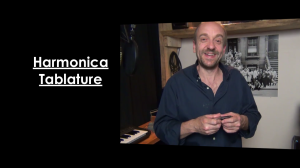
Harmonica Tabs
What hole to play.
Whether to blow or to draw.
Is there a bend to that note?
Let's learn some no-nonsense harmonica tablature to get things rolling.
Lesson Info
Difficulty: Easy
Lesson Length: 4:06
Instructor: George Goodman
What hole? Draw or blow? Any bend? Here's how I notate it.
Recommended Gear
A C harmonica is the first one you need to follow along with the lessons on the site. I often play a Hohner Special 20 Harmonica in the key of C through a Shure Green Bullet microphone Model 5200 and Fender Super Champ amplifier
Harmonica Tabs
Standard Notation Vs Tablature
There really isn’t a substitute for proper music notation to portray a piece of music so that a musician can read it and create the music required. The investment needed to learn to read music notation may be more than a beginning musician is willing to learn before starting to play. For that reason, simplified forms for representing notes have been developed that are easier to understand.
These simplified forms are known as tablature. There is tablature or tabs for both guitar and harmonica. There is not a single standard way to write harmonica tabs and as a result, the method I use for writing harmonica tablature may be different from how some others do it.
My real recommendation is to learn how to read standard music notation where you get pitch, rhythm, dynamics, tempo and all sorts of nuances to give a true representation of the music. A study of music theory and notation is addressed later but for now let’s get started with my own simple homegrown harmonica tablature.
George's Homegrown Harmonica Tablature
The holes on the harmonica are numbered 1 through 10, so these are used to indicate the particular hole to sound. Since notes are sounded by both blowing and drawing, that also needs to be represented. This is accomplished by signifying draw with a minus sign.
For example, drawing on the 4 hole is written as -4.
If there isn’t a minus sign in front of the number that signifies to blow.
-4 = draw 4
4 = blow 4
Adding The Bends
Since most holes on the harmonica can be bent to varying degrees, this also needs to be represented. This is accomplished by putting a ‘b’ after the hole number for every semi-tone the note needs to be bent. For example, hole 3 can be bent a total of three semi-tones. On a C harmonica, draw 3 or -3 without bending sounds the note B. Bending down a single semi-tone, also known as a single bend, to Bb would be notated as -3b. Bending down 2 semi-tones, a double bend, to the note A would be notated as -3bb and bending down 3 semi-tones, a triple bend, to the note Ab is notated as -3bbb.
-3b = draw 3, single bend (one semi-tone)
-3bb = draw 3, double bend (2 semi-tones)
-3bbb = draw 3, triple bend (3 semi-tones)
Here are the tabs for a blues scale which requires bending: -2 -3b 4 -4b -4 -5 6
Single Notes Vs Chords
Individual notes are separated by a space. If more than one note is sounded at once, then they are shown without spaces between the hole numbers.
For example, when sounding the G7 chord on the C harmonica by drawing on holes 2 3 4 and 5 would be shown like this: -2-3-4-5.
Playing the notes individually is notated with spaces: -2 -3 -4 -5.
Rhythm
So that covers pitch. The difficulty arises trying to represent duration of notes and rhythm. This adds a degree of complexity that gets us approaching formal music notation. For now, I will generalize the rhythm by placing the hole numbers as described above into individual bars or phrases which are represented with ‘|’.
Here is an example of notating a major scale played as quarter notes going up and down. Each measure will receive 4 beats and each note lasts for a beat:
4 -4 5 -5 | 6 -6 -7 7 | 7 -7 -6 6 | -5 5 -4 4
Undoubtedly, harmonica tabs can be expanded by adding symbols to represent rhythm and embellishments but I prefer to keep it simple with the main goal of teaching you to read standard notation a little further on.
5 Pack Case of Hohner Special 20s
What do I like about the Special 20s?
Great Sound, Smooth Comb, Responsive to Bending - but not loose, Affordable. I play Special 20s more than any other model.
Martin Acoustic Guitar Strings
If it's been a while since you've changed your strings, you won't believe the difference in the sound. These are some excellent Martin strings. Need I say more? Totally affordable.
Hohner Harmonica Holder
The Hohner Harmonica Neck Holder fits harmonicas up to 7-1/2" long, has a nickel plated finish and fits any neck shape.
I have used a similar holder for over 25 years. This no-nonsense holder will work for you.

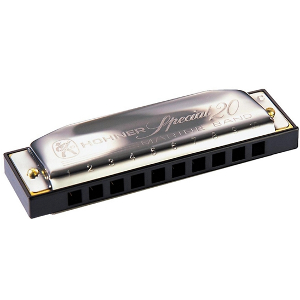
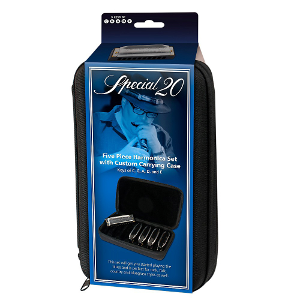
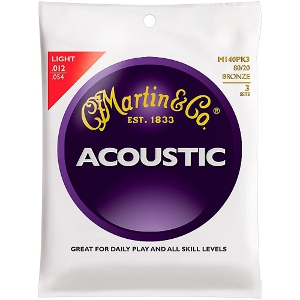
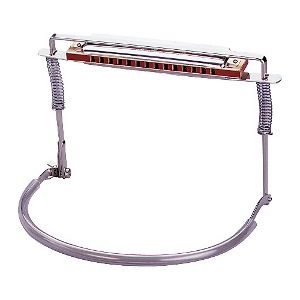
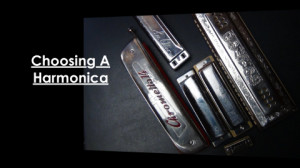
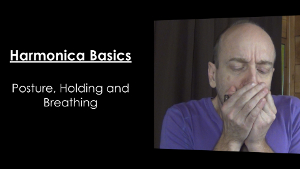
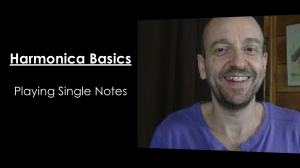
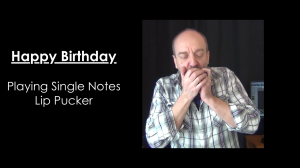

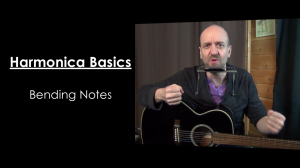
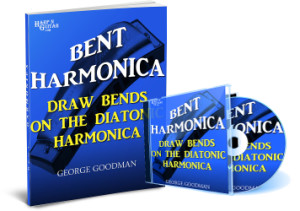
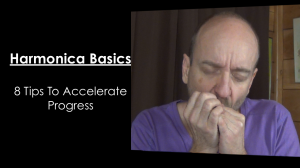
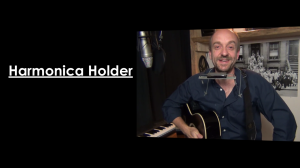
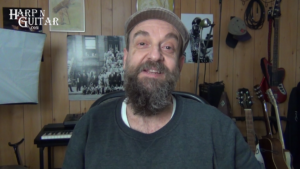
I like to learn All along the watchtower on harmonica but I can’t find it